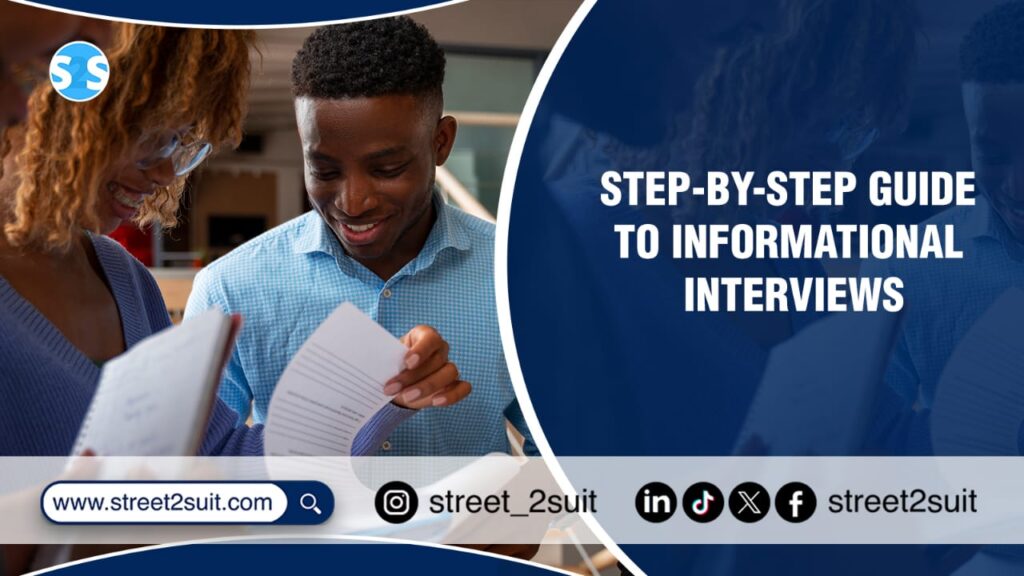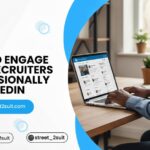If job hunting had a secret handshake, the informational interview would be it. Not quite a job pitch and not quite a mentoring session, an informational interview is a brief, focused conversation with someone doing the work you want to learn about. It serves as your backstage pass to a career, without the velvet rope or awkward small talk.
Why bother? Because networks, not just résumés open doors. Studies consistently show that many hires happen through networking and referrals. An informational interview is a polite, low-pressure way to build these relationships, learn what hiring managers value, and determine if a role is right for you before you waste time and dignity applying for jobs that aren’t a good fit.
Know Your Why and Write It Down
Before reaching out to anyone, be crystal clear about your goal. Are you:
– Exploring a new field?
– Figuring out what skills to learn?
– Seeking insider advice on breaking into an industry?
– Hoping for referrals not directly—more on etiquette later?
Write a 1-2 sentence purpose. Example: “I’m exploring product management because I love building user-centered solutions and want to know what skills matter most when switching from marketing.”
Why this matters:A clear purpose focuses your questions, respects the other person’s time, and makes you sound like someone worth helping.
Find the Right People
Look for:
– Individuals in roles you aspire to (1-2 levels ahead is ideal).
– Alumni from your school.
– Employees at companies you admire.
– Participants in professional groups, Slack communities, or conferences.
Start with people just a step or two ahead of you—not the CEO. Mid-level professionals are more accessible, and their advice is often practical and immediately useful.
Craft the Read
Keep your outreach short, specific, respectful of their time, and human. Here are two templates you can copy, paste, and personalise.
LinkedIn/Email Template (Informational):
> Subject: Quick 15-Minute Chat About Product Management?
> Hi Maryam,
> I’m Rahmat Yusuf, currently [current role/student]. I admire your path from [X] to [Y]. I’m exploring product management and would love 15-20 minutes to ask a few quick question
If you receive no reply after 7-10 days, a polite follow-up is acceptable. If there’s still no response after that, it’s best to move on.
Prepare Like a Host
If they agree to chat, research them and their company. Read their LinkedIn summary, recent posts, and the company website. Prepare 6-8 focused questions, aim for depth not breadth. Print or open your notes to avoid fumbling during the conversation.
Sample Questions:
– What does a typical day look like for you?
– What skills were most important when you entered this role?
– Which tools or certifications should I prioritize?
– What do you wish someone had told you before you started?
– How does your company hire for this role? (Process, interviews, assessments)
– Are there common misconceptions about this job?
Keep the tone conversational. Use follow-up questions like, “Can you provide an example?” to turn surface-level answers into useful details.
Respect the Clock And Their Sanity
Stick to the time you promised—15 or 20 minutes. If the conversation flows and they offer more time, great! But don’t be the person who turns a “quick chat” into a lengthy ordeal.
Begin with a sentence that restates your purpose, and end with a specific closing: ask if they mind you following up, or if they can suggest one or two colleagues you could speak with next.
Listen, Take Notes, and Be Useful
Be present. Ask fewer rehearsed speeches and more questions. Take notes discreetly—the goal is to learn, not to impress.
Offer value where possible—share a relevant article, introduce them to someone helpful, or provide a quick suggestion if appropriate. Networking is a two-way street; even small exchanges of value are remembered.
Follow Up Like a Pro
Within 24 hours, send a concise thank-you note that includes:
– One specific insight you gained.
– One action you’ll take because of the conversation.
– (Optional) A polite request for a referral or another contact, but only if appropriate.
Example:
Turn Insight into Action
Don’t let the conversation fade away after the meeting. Use what you learned to:
– Update your learning plan (courses, projects, reading).
– Build or refine a portfolio item (case studies, projects).
By taking action, you’ll ensure that the insights gained from the informational interview lead to meaningful progress in your career journey.
Conclusion
– Purpose
– Right Contact
– Short Outreach
– 6–8 Thoughtful Questions
– Respect Time
– Send Thank-You Note Within 24 Hours
– Take Action and Follow Up
An informational interview is a small investment that can yield significant returns: clarity, connections, and often unexpected opportunities. It transforms strangers into guides, coffee meetings into career research, and anxiety into proactive steps. Approach it respectfully, do it frequently, and watch how your career path evolves from uncertainty to strategy.
Now, reach out to someone—politely, confidently, and with a strong opening line. You have questions, and the right people have the answers.
Receive the latest job and career updates in your inbox, every week!
Mariam is an imaginative and meticulous writer who is passionate about crafting compelling narratives and translating concepts into influential content.




